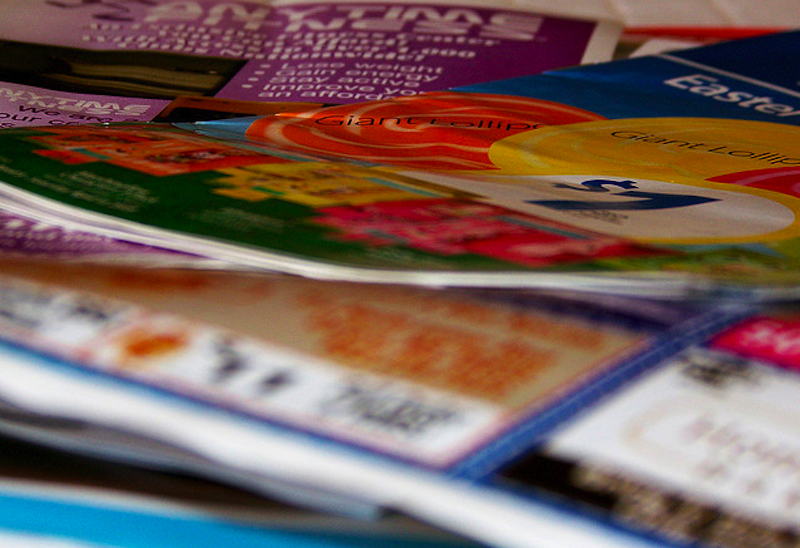Dear Direct Mailers:
Read this immediately! Urgent! Your credit score is being eaten by lions! I can help!
I have one credit card, it’s not doing so hot, and I’m smart enough not to mitigate these damages by opening up another wound which will invariably fester. Bloodletting is way too old school for me.
I’m bored and frustrated by your endless reams of junk mail. I know that you’ll occasionally find a sucker whose oblivious optimism or abject hopelessness will blind them to your fine print, but I am not that person. I’ll even venture far enough to say that a vast majority of your marks aren’t those people. Your efforts to entice and ensnare are relatively impotent, so why do you continue? When it comes to advertising, we’ve been honed into cynical, doubtful people, thanks in no small part to x-ray specs and real, flying ghosts hawked from the back of comic books, or promises of generic pills which enlarge and/or harden and/or grant our unmentionables mystical properties.
I wouldn’t be able to tell you how many pounds of paper I’ve recycled over the past 10 years, and I don’t think I can quantify how much of that was junk mail, though 41pounds.org estimates that weight to be somewhere around 410 pounds of useless garbage that’s come my via the gaping, unquestioning maw of the mailbox.
Despite the shocking inefficiency of direct, unsolicited mail, it continues. It continues at a nauseating cost to the environment—consuming trees, water, and a whole lot of costly, diminishing fuel reserves while leaving an ugly carbon footprint. So why is it so difficult to stop? With legislation to fight unwanted marketing phone calls, and technological steps to kill spam, why is it more difficult to fight the transmission of a physical object than ephemeral ones? Isn’t building a dam essentially a simpler process than building a ghost trap?
41 Pounds offers to help you escape these lists by contacting “20 to 30” direct mailing companies on your behalf—for $41, which only lasts five years (while the Do Not Call and Do Not Fax lists are free services). There’s no description of which companies are contacted, or how, or even the effectiveness of asking pretty please to a bunch of faceless, corporate entities. This, apparently, is a trade secret worth 41 of your dollars, but through the green and blue vistas that blanket the 41 Pounds website, and altruistic but ambiguous mission statements dripping with statistics, it’s not actually clear what they do, aside from sit at the top of Google, collect your money, and hit “send.”
The same (similarly mysterious) service can be performed at DirectMail.org, for free, and for the same duration, which leads to the obvious conclusion that these two things might be more closely related than they appear, though DirectMail.org also attempts a clever sucker-punch too. After a “remove me from all unsolicited mailing lists” button, you’ll find a page replete with checkboxes that describe junk mail topics. The implication is that by clicking these boxes, you’ll allow these types of mail through this filter. Read the fine print and you’ll find that you’re actually signing up for new mail from these genres of junk. Pretty sneaky, sis.
Still, the junk mail comes. While I’ve taken to recycling a vast majority of the influx, a system plagued by inefficiencies and at a cost to my local government, some of this mail finds itself redirected with a satisfying vindictiveness, as there comes a time in which politeness and reasonable arguments no longer function. My personal requests to stop junk mail have gone unheeded, so the time has come for more direct measures.
Mail that arrives with a pre-paid mailing envelope (which is just about all of it) is opened, repackaged, and returned. Rather than send in the measured and expected weight of the company’s reply form, I take a particular pathetic delight in stuffing all propaganda, as well as the original external mailing envelope, into the pre-paid envelope and shipping it back with a scrawled, slightly deranged-hermit-in-a-cave-esque request to STOP SENDING JUNK MAIL. This method consumes the same amount of carbon emissions for transit as the original mailing, but it occasionally provides enough personal, and highly directed, motivation to halt the always disappointing “Is it a check? No, it’s junk mail” sensation that this garbage catalyzes. And it’s far more efficient than taking a round-trip drive to Bank of America HQ to deliver these missives to the hapless employees.
I hope these companies have mandatory recycling programs established for just such an unwanted mailing, and perhaps they’ll feel the tingle of anticipation at scoring a new client, only to suffer the acute deflation of disappointment wrought by my Sharpie and a little bit of sweet, sweet envelope glue. And, with luck, I’ll be blacklisted among the direct mail division of Chase Visa for my renegade fight against their infractions against my mailbox.
The Battle Against Junk Mail
And how you can be a jerk about it.

zamburak
